Programme and keynote speakers
Tim Bonyhady, Australian National University
Gregory Lehman, the University of Melbourne
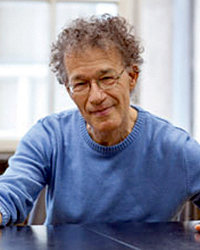
Curating the Colonial: Reflections on The National Picture: The Art of Tasmania's Black War
Tim will discuss how the exhibition evolved as a jointly curated venture; Greg will discuss the Aboriginal community consultation process, including the responses to the Robinson material; Tim will discuss the proposed exclusion of the Law bust of Robinson at the TMAG showing of the exhibition; Greg will discuss the exclusion of the French lithographs at Tasmanian Museum and Art Gallery and their inclusion at Queen Victoria Museum & Art Gallery (QVMAG); Tim will discuss the omission of Duterrau's Conciliation from QVMAG and how one of David Gough's spears came to be the front-of-house work; and Greg will conclude with some reflections on the show.
Professor Tim Bonyhady is one of Australia's foremost environmental lawyers and cultural historians, a Professor of Law at the ANU where he is also Director of the Centre for Law, Arts and the Humanities (CLAH). His many books include The Colonial Earth (Miegunyah Press 2000), which examined the origins of environment concerns and colonial art practice in Australia. Tim was co-curator of the National Gallery of Australia's recent exhibition, The National Picture: The Art of Tasmania's Black War, which connects colonial Tasmanian art to themes of representation, the rule of law, rights and injustice. His book on this material, with Greg Lehman, was published by the National Gallery of Australia in June 2018.
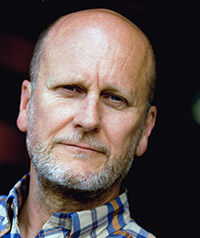
Greg Lehman is currently a McKenzie Research Fellow in Art History at the University of Melbourne. He has held previous research appointments at the Australian Institute of Aboriginal and Torres Strait Islander Studies, and the ANU's National Centre for Indigenous Studies. In 2017, he received the 2016 AAANZ award for 'Best Art Writing by an Indigenous Australian' for his essay Benjamin Duterrau: the Art of Conciliation. A curator and essayist on history, identity and place, Greg is an Indigenous advisor to Hobart's Museum of Old and New Art and, with Tim Bonyhady, recently co-curated The National Picture: the Art of Tasmania's Black War; a major touring exhibition at the National Gallery of Australia. Greg recently completed a PhD at the University of Tasmania's Academy of the Arts. His thesis, 'Regarding the Savage: visual representations of Tasmanian Aborigines in the nineteenth century' extended Bernard Smith's analysis of Enlightenment ideologies in the South Pacific.
Penny Edmonds, University of Tasmania
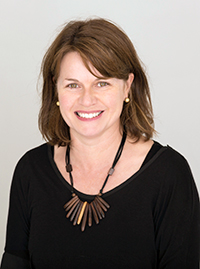
Black Line/Confiscation Line: Risky Performances and Contesting Reconciliation in Australia and Aotearoa New Zealand
Philosopher and playwright Hélène Cixious has described theatre as 'by definition the stage where the living meet and confront the dead, the forgotten and the forgettors, the buried and the ghosts, the present, the passing, the present past and the passed past'. Nowhere, I argue, is this more apparent than in the working through of the public, performative politics of reconciliation in settler societies, where Indigenous and non-Indigenous peoples meet in the long shadow of colonial frontier violence. In this talk, I explore two Indigenous-led performances that deal directly with the colonial past and its aftermath: Tame Iti's fiery re-enactment of the New Zealand Land wars at the historic confiscation line in Ngāi Tūhoe country in 2005, and the 'Black Line' ceremony in Tasmania in 2001.
This talk considers these material lines of colonial warfare in the landscape and the 'lines' of the settler archive that serve to entrench colonial narratives against the re-visioning ‘lines’ of subversive Indigenous performance. Rather than peace-building ceremonies of unity and good feeling accompanied by the handshake that are the signature gesture of state based reconciliation, this talk explores the radical crossings of two colonial lines of violence and the 'affective alchemy' of the performances, including anger/rejection, endurance/survival and togetherness as performed by Indigenous peoples and others as they make claims on the settler state. These are risky performances, fierce acts of anti-forgetting drawn from the archive of Indigenous embodied genealogy and action, which reject colonial narratives and refuse that these sites of violence remain as 'dumb places' where the events of the past cannot be spoken.
Penny Edmonds is Associate Professor and a recent ARC Future Fellow (2012-2017) in the School of Humanities at the University of Tasmania. Penny's research interests include colonial/ postcolonial histories, humanitarianism and human rights, Australian and Pacific-region transnational histories, performance, and museums and visual culture. She is a recent co-editor of Australian Historical Studies (2015-2018). Her books include Urbanising Frontiers: Indigenous Peoples and Settlers in 19th-Century Pacific Rim Cities (UBC Press 2010) and Settler Colonialism and (Re)conciliation: Frontier Violence, Affective Performances, and Imaginative Refoundings (Palgrave 2016), which was shortlisted for the Ernest Scott Prize in 2017. Penny presented the 2017 Trevor Reese Memorial Lecture in Australian History, at the Menzies Centre for Australian Studies, King College, London, titled 'Heart, Power, Treaty, Truth: Affective, Political Performances in (post) Reconciliation Australia'.
Bruce Pascoe, Wathaurong Aboriginal Co-operative
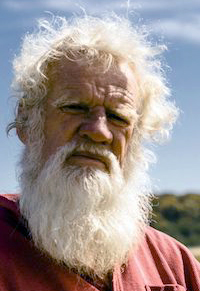
Dark Emu
Myths about the lives of pre-colonial Aboriginal and Torres Strait Islander people have proven deeply entrenched. But in his 2014 book Dark Emu, Bruce Pascoe struck a grievous blow to one of the most widely accepted assumptions of Australian pre-settlement history. He argued, and presented robust evidence drawn from the journals of European explorers, that Indigenous people were not hunter-gatherers at the time of colonisation.
'The evidence insists that Aboriginal people right across the continent were using domesticated plants, sowing, harvesting, irrigating and storing - behaviours inconsistent with the hunter-gatherer tag,' he has said.
Dark Emu, which won Book of the Year at the 2016 NSW Premier's Literary Awards, also challenges existing narratives around housing construction, cooking and clothing prior to European settlement. What does challenging the past of Aboriginal and Torres Strait Islander people mean for the present?
Bruce Pascoe is a Bunurong, Yuin and Tasmanian man born in the Melbourne suburb of Richmond. He is a member of the Wathaurong Aboriginal Co-operative of southern Victoria and has worked on the retrieval and teaching of Wathaurong language. With Lyn Harwood, Bruce edited and published Australian Short Stories for sixteen years. His many novels include Night Animals (1986), Shark (1999), Earth (2001) and Ocean (2002). His book Fog a Dox won the Young Adult category of the 2013 Prime Minister's Literary Awards. His non-fiction publications include Convincing Ground: Learning to Fall in Love with Your Country (AIATSIS 2000) and Dark Emu: Black Seeds: Agriculture or Accident (Magabala Books 2014), which won the NSW Premier's Literary Awards Book of the Year in 2016. This book was also the inspiration for the Bangarra Dance Theatre's recent production Dark Emu, directed by Stephen Page.
Lynette Russell, Monash University
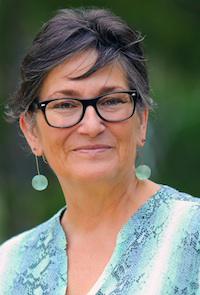
Colonial Narratives: Affect and archival subjects
It is a common understanding that Australia was colonised without the consent of the traditional owners despite substantial and unequivocal instructions from the British Colonial Office. Nearly thirty years ago Henrietta Fourmile described Aboriginal people as 'captives of the archives' and alerted us that engaging with historical materials which emerge out of this illegal occupation can implicate the researcher in the ongoing processes of colonialism. Historians, and other users of archives, often observe the excitement and emotion of their 'discoveries'. Archives containing the physical remains of the past can transport us, we can move beyond the here and now we can time travel and retrace the past.
For many Aboriginal people archival research can also be a minefield of affect and distress. In this talk I will consider several case studies where the experience of delving into colonial archives elicits complex responses ranging from re-inscribing historical trauma, to the euphoria of discovering lost ancestors and kin. The colonial archives and the narratives they enable us to develop are forever enmeshed in delicate tension as the researcher attempts to balance the power of the written word with the lived experience of the archival subjects.
Professor Lynette Russell is Director of the Monash Indigenous Studies Centre (MISC) at Monash University, Melbourne. She has published widely in the areas of Indigenous and contact history, post-colonialism and representations of race, ethnographic knowledge and archaeology. Her many books include Roving Mariners: Aboriginal Whaler and Sealers, in the Southern Oceans (SUNY Press 2012) and, with Kate Auty, Hunt Them, Hang Them: 'The Tasmanians' in Port Phillip, 1841-42 (Justice Press 2016). Lynette was a contributor to the NGV's Colony: Australia 1770-1861/Frontier Wars(2018), where she was also one of the exhibition's opening speakers. She is the current President of the Australian Historical Association.